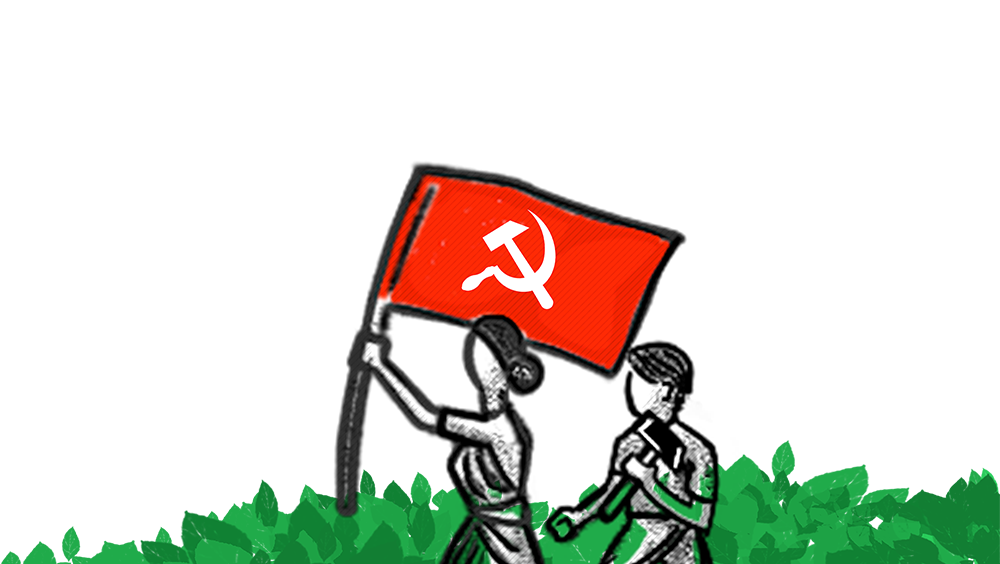Inaugurating the conference, social activist Dr. Navsharan Singh stated that today there is a multifaceted attack of fascism to the extent that gathering and sitting together can also be considered a criminal activity. If a person is filled with intellect and reason, they have already entered the realm of crime. Umar Khalid has been imprisoned by fascists for five years. The brutal use of tools of oppression and division is being carried out by the power, but at the same time we have witnessed the women's movement against the CAA and the farmers' movement which intensely exhibited people’s resolve and the culture of unity and struggle. We will defeat the hatred of fascists with our heritage, mutual love, and unity.
The outgoing national president of Jan Sanskriti Manch Ravi Bhushan said that divisive forces were never so strong in independent India before 2014, but after BJP’s ascent to power all democratic and constitutional institutions have been subverted and all pillars of democracy have collapsed.
Renowned documentary filmmaker Biju Toppo mentioned that Jharkhand has a long history of anti-displacement movements, indicating that it is a land of struggle. Jharkhand has a rich legacy of fighting against fascism through our songs, poetry, and plays in the struggle to save water, forests, land, language and culture.
Mahadev Toppo from Progressive Writers’ Association stated that in the absence of adequate resistance to the violence against women, Dalits, and Adivasis being perpetrated for centuries, the situation has laid out a red carpet for fascism. The cases from Umar Khalid to Father Stan Swamy reveal the brutal face of the surveillance state.
Professor Rashid from Jammu University said that today we are witnessing things happening that could not have been imagined a few years ago. The water being sold in the market and the flow of rivers being stopped. He also spoke about Israeli genocide in Gaza and imperialist attacks on Iran.
Documentary filmmaker Sanjay Kak shared his experiences and said when we began making documentary films on public issues, they attracted bigger crowds in auditoriums, however, the ruling powers gradually started imposing restrictions and screenings were stopped. Now we must use new platforms like YouTube, Instagram, and Facebook to reach today's generation to counter right-wing activism on these platforms.
M. Z. Khan from Janwadi Lekhak Sangh stated that we are going through delicate times where people are unable to speak out under the reigns of communal fascism, nourished by capitalism. A particular community is being targeted, hatred is being spread openly through religious assemblies, and there is silence everywhere. He emphasized that the country needs a strong cultural movement today.
Shailendra from IPTA quoted Gramsci and said the ideological hegemony of fascists, being nourished by the Brahminical exploitation system, must be resisted. A strong cultural movement should counter the thoughts and behaviors being dictated by the market and corporations. Narendra Modi also is a political product of corporations.
While conducting the inaugural session, Professor Ashutosh Kumar termed fascism as a cultural counter-revolution. Today, devotion and servitude are being established in place of freedom, and patriarchy and caste hierarchy are being established in place of equality. We must defeat this counter-revolution.
Professor Uma expressed gratitude and called for solidarity for the release of Umar Khalid. Professor Sudhir Suman read a condolence proposal, and the session concluded with a minute of silence.
The second day of the conference was the organizational session in which General Secretary Manoj Kumar Singh presented a report. More than two dozen representatives from various states expressed their views, and many suggestions were made. The presidium of this session included Siyaram Sharma (Chhattisgarh), Ahmed Sagir (Bihar) and Kaushal Kishore (Uttar Pradesh). Prem Shankar conducted this session. Incorporating the suggestions provided by the representatives, the house passed the report.
Senior theater artist, poet and writer Jahoor Alam was elected as the new president, writer and journalist Manoj Kumar Singh was reelected as General Secretary. The conference also elected Shivmurti, Ramji Rai, Madan Kashyap, Bharat Mehta, Laltu, Surendra Prasad Suman and Kaushal Kishore as vice-presidents; and Sudhir Suman, Anupam Singh, Roopam Mishra, Ahmed Sagir and Rajkumar Soni as secretaries, K.K. Pandey as the treasurer. A 52-member National Executive Committee and a 213-member National Council were also elected.
Cultural programs held in the evenings of both days, along with various sessions, featured musical presentations of songs, dance, plays, and poetry by cultural teams and artists from states such as Jharkhand, Bihar, Uttar Pradesh, Bengal, Chhattisgarh, Odisha, and Telangana, which were a major attraction of the conference. The conference concluded with the singing of "We Shall Overcome" and a commitment to intensify the cultural campaign against fascism in their respective fields.





